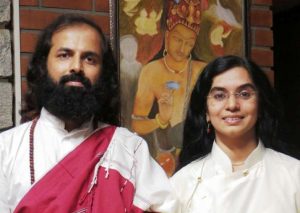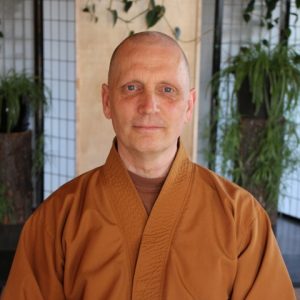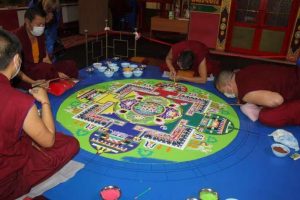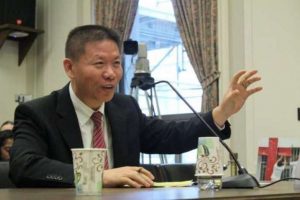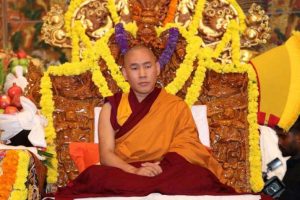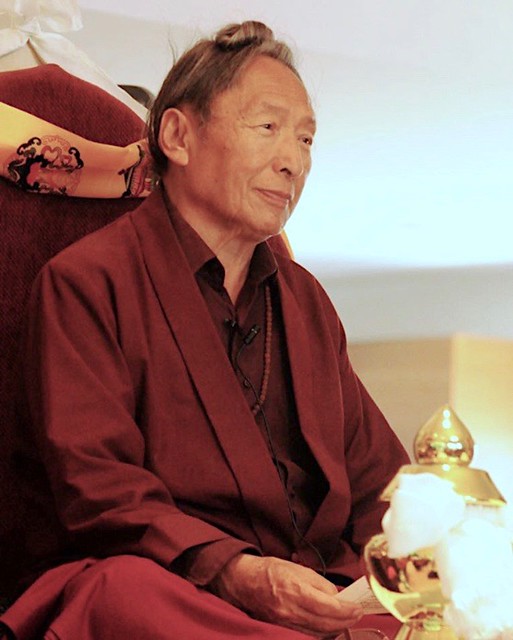
The light of the guru is a lamp that never goes dark.
My root teacher is still the North Star in the night sky, though he passed into parinirvana on 22 July 2013. I miss him deeply, yet the bond endures. The intent of the teacher-student relationship is to awaken and cultivate the student’s awareness of their own original nature, such that they no longer need to rely in the same way on the outer human guru. For a slow learner like me, this can take a long time. Through guru yoga practice, the inner guru is brought to life. Over time, the inner guru becomes a compass that never falters. The key point, just as when the lama is alive, is consistently returning to the heart of genuine refuge—bodhicitta and guru yoga practice—every day, in every possible moment. When I admitted to one of my living teachers that I felt the shame of being lazy, distracted, and complacent, as well as deeply grateful for all I have received through the lineage blessings, he replied, “Focus on the gratitude.” It is a continual practice of forgetting and remembering. Practice is applying attention and effort to training one’s mind, just as physical exercise trains the body. What is guru yoga and how does it work? One needs a karmic connection with a living teacher, oral instruction, patience, discipline, and a simple text such as the Dudjom Tersar Ngöndro (Preliminary Practices).
According to my precious teacher, “When the Guru’s instructions have penetrated the student’s heart, this is the same as finding a precious Wish-Fulfilling Jewel in your hand. Someone who has received the Guru’s mind transmission has no choice but to attain enlightenment, just as someone falling down a steep mountain totally out of control has no choice but to fall all the way to the bottom.” (Lama Tharchin Rinpoche 2000) My teacher’s teacher, Dudjom Rinpoche, the supreme Nyingma lineage holder, said in his Mountain Teachings (Richö), “In particular, it is vital to put all your energy into the Guru Yoga, holding onto it as the life and heart of the practice. . . . Fervently praying with uncontrived devotion, after a while the direct blessing of the wisdom-mind of the lama will be transmitted, thereupon empowering you with a unique realization, beyond words, born deep within your mind.”*
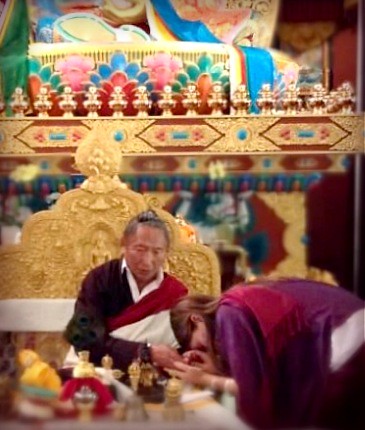
© Sonam Famarin
But what happens after the teacher has shed his or her physical body? Three aspects of an enlightened master’s mind are omniscience (khyen pa), power (nü pa), and compassion, (tsé pa). As a student on the path, one emulates these qualities by trusting that we already know what we need to know, striving to be fully present and engaged, and by being open, in a state of evenness, neither grasping nor rejecting.** These qualities, whether already perfected by a great master or being newly cultivated by the student, persist beyond the physical plane. The basis of the mind of awakening is our own trust and devotion, and the knowledge, deep in our bones, that we have always had. This is the opposite of blind faith.
There’s a drawing of a woman stepping off a cliff, holding a rope in one hand that extends out before her, becoming the tightrope she balances upon to cross a deep abyss. Similarly, since my teacher passed I feel that I am continually stepping into a river, not knowing the depth, placing my outstretched foot in midair. In the very moment I need one, a rock rises up from somewhere under the water to meet my foot, forming a stepping-stone to support my journey. This is based not on any personal merits but on the great fortune of my connection with my teacher and lineage. Finding and deepening intimacy with this perfection is bowing our heads to wisdom in a way that our own inner wisdom can spring forth, grow new leaves, and flourish. Again and again we rekindle the light within by relying on the guru, seen and unseen. Trust and confidence cultivated over years provide stability of mind when all in the outer world seems to be crumbling.

“The human guru holds the foundation of your life that you are unaware of. When he or she passes, you have to find it and hold it yourself. This takes time.”*** Lineage is everything. As family heirlooms are passed from one generation to the next, an authentic practice lineage continues unbroken through oral and written tradition, as well as mind-to-mind transmission. Without a qualified teacher, we are lost in a sea of our own confusion and ego-clinging. By taking refuge and empowerment repeatedly, we re-commit to awakening for all beings. For all the richness and complexity of myriad Vajrayana practices, the simplest and most immediate link to our true nature occurs via guru yoga. Simply recalling the qualities of one’s teacher in a heartfelt way brings direct and immediate blessings. Cultivating a deep connection over time brings unshakeable stability.
There were so many aspects about my teacher that I loved; his joyous laughter and giggling, his wrathful approach when needed, subtle interpretations of the Dharma, his soft warm hands, gentle hug, intense fondness for children and babies, deep appreciation of proportion in art and natural beauty, his love of tending his garden, chopping wood, greeting the animals that wandered into his yard, be they llamas, horses, donkeys, or deer. And the countless times he taught us the Dharma, using all of his strength, patience, humor, and experience to do so. These are treasured memories.
Some may meet their teacher only once, while others have the great fortune to spend years in proximity. Those children born and raised with the Dharma are fortunate indeed.
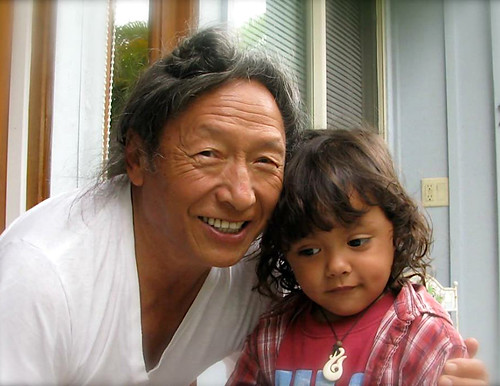
I recently dreamed that I was giving a Dharma teaching. The experience of teaching in a dream at all is the inner guru. I reached a point where I really did not know what to say. In the dream there were two paths to enlightenment: the first, an arrow drawn from point A to point B, which felt false, a misconception about having somewhere to get to beyond where we already are; the second a series of concentric circles of letting go, letting go, letting go—infinite layers of deepening and refining, as ripples expand across a pond’s surface.
As a fish glides effortlessly through water, is it breathing water or is the water breathing the fish? A fish breathes by gulping water in and releasing it through its gills, thereby absorbing oxygen into the bloodstream. In a seamless cycle, the fish inhales water, water envelops fish. Who is breathing whom? We blend our mind inseparably with the teacher’s, who is none other than our own true nature, since the beginningless beginning (as my precious teacher put it). Breathing through us is the intangible subtlety of consciousness, that which persists through cycles of death and rebirth, the source-of-all-life, truth, or whatever we may name it.

A student once asked the noted author and educator Rene Querido, “Does one have to love oneself first in order to love others, or first love others in order to love oneself?” Querido’s answer was, “Yes.” This breathing, enacting love, and practicing guru yoga are simultaneous, symbiotic, interdependent, and co-emergent activities of engagement. The guru is omniscient, powerful, and compassionate. And when freed of the constraints of a human form, omnipresent. By merging my heart-mindstream again and again with the guru’s, barriers melt away. I am the guru, the guru is me. There is no guru, there is no “me.” And then I forget, and thus I practice.
May I be never separate from my precious teacher’s wisdom mind until I and all beings reach enlightenment as one mandala.
For more information on Lama Tsédrup Tharchin Rinpoche, including his audio and video teachings, please visit: Heart Teachings by Lama Tharchin Rinpoche
** Lama Yeshe Wangmo, private teaching, 2008.
*** Lama Yeshe Wangmo, Facebook post, 2014.
References
Lama Tharchin Rinpoche. 2000. Ngondro Commentary. Watsonville, CA: Bero Jeydren Publications.
See more
Dudjom Tersar Ngondro Program of the Vajrayana Foundation at Pema Osel Ling
Moondrop Meditation (workshops with Sarah C. Beasley)





